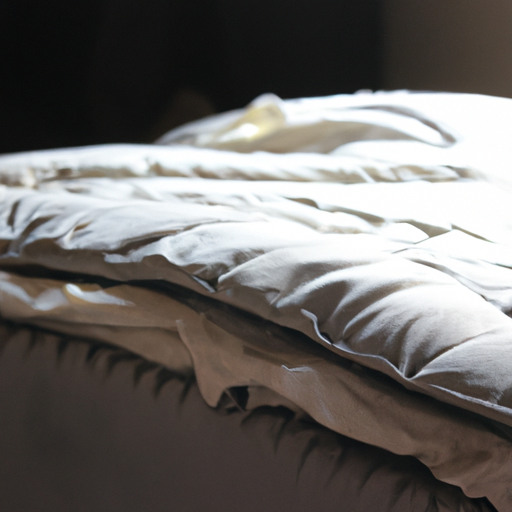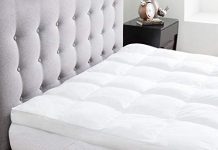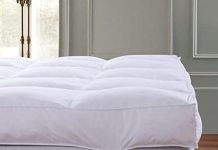When it comes to getting a good night’s sleep, the quality of your mattress plays a crucial role. But how do you know when it’s time to bid farewell to your faithful old mattress? As the years go by, our bodies change and so do our sleeping needs. In this article, we will explore the telltale signs that indicate it’s time to upgrade to a new, more comfortable mattress. From sagging to discomfort, we’ve got you covered. So, grab a cup of coffee and let’s uncover the secrets to recognizing when it’s time to say goodbye to your old mattress and hello to a good night’s sleep.
Review contents
Signs of Wear and Tear
Sagging
One of the most common signs that it’s time to replace an old mattress is sagging. Over time, the materials in a mattress can break down and lose their support. This can result in noticeable sagging or indentations in the mattress surface. Not only does sagging affect the comfort of the mattress, but it can also lead to improper spinal alignment, causing pain and discomfort.
Loss of Support
Another telltale sign that your mattress may be past its prime is a loss of support. When a mattress is no longer able to properly support your body, you may start to notice increased pressure on certain areas, such as your hips or shoulders. This lack of support can lead to muscle aches and morning stiffness, making it difficult to get a good night’s sleep.
Visible Damage
Visible damage to your mattress is also a clear indicator that it’s time for a replacement. This can include tears, stains, or even broken springs. Not only does visible damage affect the aesthetics of your mattress, but it can also compromise its structural integrity, leading to further discomfort and potential health hazards.
Increased Allergies or Respiratory Issues
Dust Mites and Allergens
Old mattresses can become a breeding ground for dust mites, which are microscopic creatures that feed on dead skin cells. These tiny insects can trigger allergies and respiratory issues, such as sneezing, coughing, and even asthma attacks. If you find yourself waking up with these symptoms more frequently, it may be a sign that your mattress is harboring dust mites and other allergens.
Mold and Mildew
Another potential concern with an old mattress is the growth of mold and mildew. These fungi thrive in damp environments, and if your mattress has been exposed to moisture, such as from spills or high humidity, it can provide the ideal conditions for mold and mildew to take hold. The presence of mold and mildew can lead to respiratory problems and exacerbate allergies, making it important to replace your mattress if you suspect any growth.
Persistent Pain or Discomfort
Body Aches and Soreness
If you frequently wake up with body aches and soreness, it may be a sign that your mattress is no longer providing adequate support. As the materials in a mattress break down over time, they can lose their ability to cushion your body and distribute pressure evenly. This can result in increased pressure on certain areas, leading to muscle soreness and discomfort.
Back or Neck Pain
Back or neck pain that occurs specifically after sleeping can be a strong indication that your mattress is no longer supporting your spine properly. An unsupportive mattress can cause your spine to become misaligned, leading to pain and stiffness in these areas. If you find that your back or neck pain is alleviated when you sleep on a different mattress, it may be time to replace your current one.
Poor Sleep Quality
An old mattress can also have a negative impact on your sleep quality. If you frequently wake up feeling tired and unrested, even after a full night’s sleep, it could be due to your mattress. A worn-out mattress can make it difficult to find a comfortable position and can cause frequent tossing and turning throughout the night, leading to fragmented sleep and a decreased quality of rest.
Age of the Mattress
The age of your mattress is an important factor to consider when determining if it’s time for a replacement. Most mattresses have a lifespan of around 7 to 10 years, although this can vary depending on the type and quality of the mattress. If your mattress is reaching or exceeding this average lifespan, it’s likely that it has experienced enough wear and tear to warrant a replacement.
Changes in Sleep Habits or Preferences
Change in Sleep Positions
If you find yourself needing to change your sleep position more frequently or if you have noticed a significant shift in your preferred sleeping position, it may be due to discomfort caused by an old mattress. As mattresses age, they often lose their ability to conform to your body and support your preferred sleep position, leading to the need for constant adjustment.
Partner Disturbance
If you share your bed with a partner and you frequently wake up due to their movements, it may be a sign that your mattress is not effectively isolating motion. Over time, the materials in a mattress can lose their ability to absorb movement, causing disturbances that can disrupt your sleep. This can lead to ongoing sleep deprivation and strain on your relationship.
Mattress Technology Advancements
Development of Pressure-Relieving Features
Advancements in mattress technology have led to the development of pressure-relieving features that can greatly enhance sleep comfort. Newer mattresses often incorporate materials like memory foam or latex that conform to the body’s curves, providing targeted support and alleviating pressure points. If your mattress lacks these advancements, it may be worth considering an upgrade to experience the benefits of improved pressure relief.
Enhanced Motion Isolation
Motion isolation is another area where mattress technology has made significant advancements. If you find that you are frequently disturbed by your partner’s movements throughout the night, you may benefit from a mattress that offers enhanced motion isolation. These mattresses are designed to absorb and isolate motion, ensuring that you and your partner can sleep undisturbed, even if one of you tosses and turns or gets out of bed.
Lifespan of Different Mattress Types
Innerspring Mattresses
Innerspring mattresses, which have been popular for many years, typically have a lifespan of around 7 to 8 years. These mattresses are constructed with a network of metal coils that provide support and durability. However, the padding and comfort layers on top of the coils can wear out relatively quickly, leading to decreased comfort and support over time.
Memory Foam Mattresses
Memory foam mattresses are known for their ability to contour to the body, providing excellent pressure relief and support. These mattresses often have a longer lifespan, averaging around 8 to 10 years. The high-density foam used in memory foam mattresses tends to hold up better over time, maintaining their shape and supportiveness.
Latex Mattresses
Latex mattresses are durable and resilient, with a lifespan that can range from 10 to 12 years or more. Natural latex mattresses, made from the sap of rubber trees, are known for their exceptional comfort and long-lasting support. However, synthetic or blended latex mattresses may not have the same longevity as their natural counterparts.
Noticeable Wear and Tear
If you can visibly see wear and tear on your mattress, it’s a clear sign that it’s time to replace it. Tears, stains, and sagging areas indicate that the materials in the mattress have deteriorated and can no longer provide the necessary support and comfort. Additionally, visible damage can also be a breeding ground for allergens and dust mites, further compromising the overall quality of your sleep environment.
Bed Bugs or Other Infestations
Discovering bed bugs or other infestations on your mattress is a clear indication that it needs to be replaced. Bed bugs are small, flat insects that feed on human blood, and they can quickly multiply and spread throughout your home. Other infestations, such as dust mites or mold spores, can also be problematic for your health and wellbeing. If your mattress has become a haven for pests, it’s crucial to dispose of it properly and replace it promptly.
Changes in Body Weight or Health
Significant changes in body weight or health can also necessitate a mattress replacement. Weight gain or loss can impact the way a mattress supports your body, leading to discomfort and restless sleep. Additionally, if you have undergone surgery or experienced a medical condition that affects your sleep preferences or requirements, a new mattress may be necessary to accommodate these changes and ensure optimal comfort and support.
In conclusion, there are several signs that indicate it’s time to replace an old mattress. From sagging and loss of support to visible damage and increased allergies, these indicators can impact both the comfort and health aspects of your sleep. Additionally, changes in sleep habits and advances in mattress technology, along with the age and lifespan of your mattress, should be taken into account when deciding on a replacement. By recognizing these signs and taking appropriate action, you can ensure a restful and rejuvenating sleep experience for years to come.
























